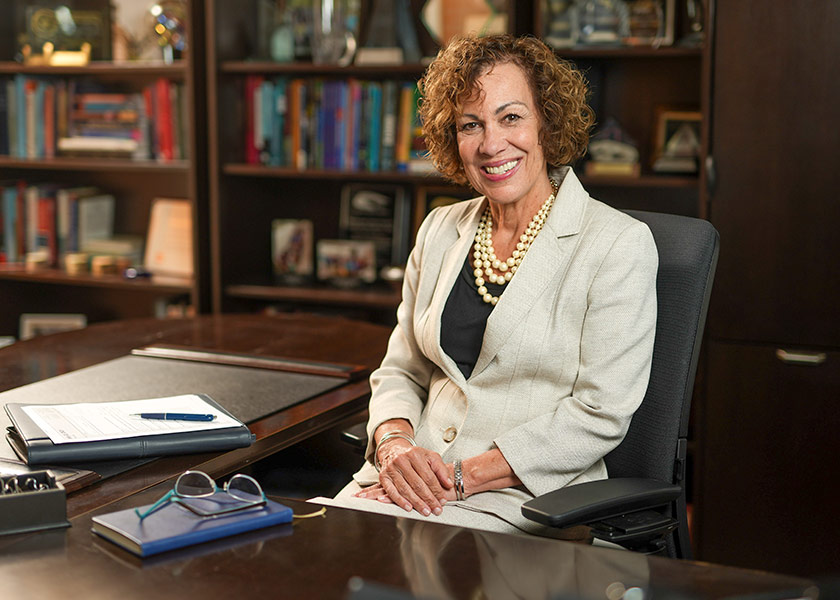
As nursing faces dramatic transformation, a new dean takes charge at Vanderbilt
Story by Ann Marie Owens
For many people, hospitals are uncomfortable places where reminders of illness and injury are at every turn. But for Pamela R. Jeffries, PhD, FAAN, ANEF, FSSH, visits to a large hospital in Indianapolis as a teenager were fascinating, even inspiring, experiences. Among the earliest influences on her career path in nursing education and innovation was witnessing the hospital staff’s dedication to patient care.
“Growing up in rural Indiana, I took memorable trips with my best friend to the Indianapolis hospital where her father was a patient,” says Jeffries, the new dean of the Vanderbilt University School of Nursing. “I was drawn to the highly charged atmosphere inside a hospital, where no two days are the same, and I knew that working in a service profession, such as nursing, would be the career for me.”
Jeffries would go on to earn a bachelor of science in nursing from Ball State University. She then went to work at a small regional hospital in Danville, Indiana, where she was a critical care nurse in the cardiovascular unit and handled code resuscitation procedures for the entire hospital.
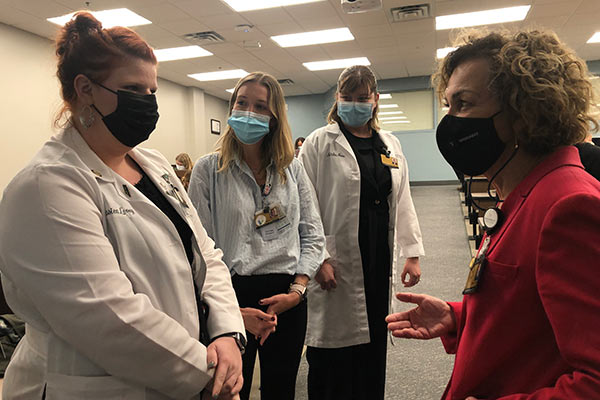
“When I started working in critical care, I had to watch the cardiac monitors,” Jeffries says. “It’s stressful, and sometimes I had dreams, actually nightmares, in which I would see arrhythmias. I would tap my sleeping husband and say, ‘Cardiac arrest.’ He would respond, ‘We rescued, go back to sleep.’ The point is that you never totally get used to the trauma and life and death situations with nursing.
“The stress level for nurses and other health professionals has been especially high during the COVID-19 pandemic because many families cannot be with their hospitalized loved ones,” she adds. “Those on the front line of COVID treatment are dealing with extensive severe illness and deaths, which is never easy, no matter how many years you’ve been in the field.”
Jeffries, who succeeded Linda Norman, DSN, FAAN, as dean last July, takes over at a time when nursing education is undergoing an unprecedented transformation. The profession is being shaped not only by a global pandemic and all its demands, but also by innovation and technology. Jeffries’ background, which includes expertise in experiential learning, innovative teaching strategies, and the use of technology in the delivery of nursing education, is well-suited for this moment of dramatic change—one in which skilled nurses are needed more than ever before.
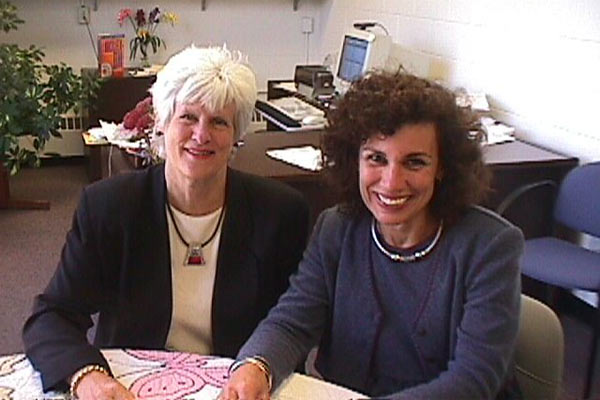
“COVID has been a ‘disruptor on steroids’ for both faculty and students in nursing education,” Jeffries says. “When the pandemic first hit, nursing students could not progress without online education, so any faculty who hadn’t incorporated online education in the past quickly changed their tune. Of course, Vanderbilt has been a national leader in nursing virtual and hybrid learning platforms for a long time. We are fully engaged in the best practices, but we must continue to ask ourselves, ‘How we can do even better in terms of bringing the most value to the student learning experience?’ Our students love the flexibility of virtual. Many of them are balancing families and jobs with their education.”
Academic Path
Jeffries’ academic path began with her move from a regional Indiana hospital to a larger hospital in Indianapolis to be a full-time critical care staff nurse. She began work on her master’s at nearby Indiana University School of Nursing. “There was an opening for a critical care nurse to teach part time,” Jeffries says. “I got the job, which ended up being full time, and that was the start to my academic career.”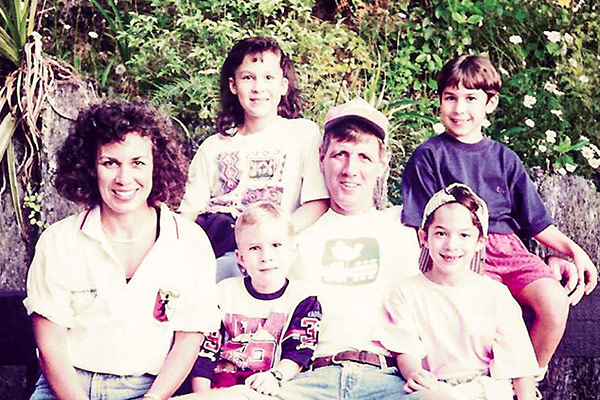
However, Jeffries’ academic life was put on hold in 1992, when she and her husband relocated with their four young children to Indonesia for his engineering career. During their four years abroad, she taught CPR and first aid classes in an impoverished area with limited access to health care. She also collected data for her doctoral dissertation on the health behaviors of English-speaking expatriates. Without the luxury of email, she had to mail her dissertation chapters to her university advisers, and delivery back and forth would sometimes take months. Jeffries often relays that experience to her students to illustrate the importance of perseverance.
When the Jeffries family returned home, she earned her doctorate from Indiana University School of Nursing and accepted a tenure-track position there. Angela B. McBride, now the nursing school’s dean emerita, became a role model and mentor to Jeffries.
“I soon realized that hiring Pam Jeffries was one of my wiser decisions as dean of the School of Nursing,” McBride says. “Pam combined her strong interests in nursing education and information technology to develop a timely and creative research program focused on simulation as a way of teaching students. She was a pioneer and leading light in this field, which has become even more important during COVID, as simulations enable students to learn clinical decision-making without having to be in a hospital.” (See sidebar.)
Jeffries was promoted to associate dean of undergraduate programs at IU School of Nursing before Johns Hopkins University School of Nursing recruited her to be a full professor and associate dean for academic programs. 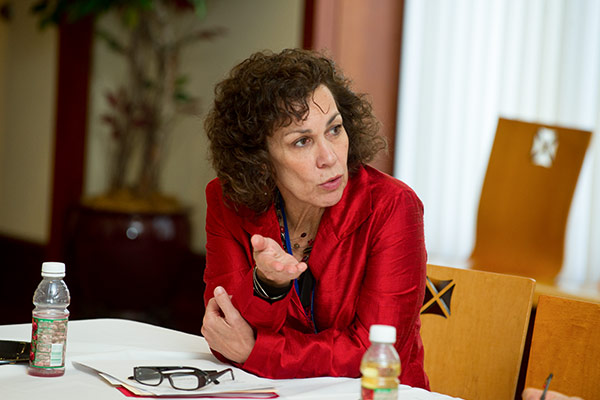
Then in 2013, Johns Hopkins University named her vice provost of digital initiatives for the university. “Online education was not being widely embraced at many traditional colleges and universities at that time,” Jeffries says. “I worked in university administration, connecting associate deans, instructional design directors and others across 10 schools to promote shared resources and harness the energy for a successful approach to digital learning.”
Leadership Style
Before joining Vanderbilt this summer, Jeffries served as dean of the George Washington University School of Nursing, which experienced a significant period of growth during her tenure. At GW, she became known as a systems thinker, achieving significant improvements in the school’s operations, services and academic programs. Among her accomplishments were expanding the 5-year-old school’s infrastructure and developing initiatives to build an inclusive and diverse school community.
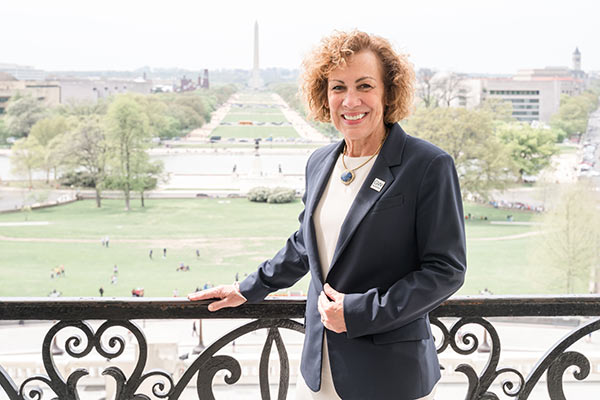 Based in the nation’s capital, she played a strong role in shaping nursing policy and continues to be an ambassador and advocate for nurses nationally through her service on the board of directors of the American Academy of Nursing. She is a fellow of the American Academy of Nursing, the NLN’s Academy of Nursing Education, the Society of Simulation in Healthcare and an alumna of the Robert Wood Johnson Foundation Executive Nurse Fellows program.
Based in the nation’s capital, she played a strong role in shaping nursing policy and continues to be an ambassador and advocate for nurses nationally through her service on the board of directors of the American Academy of Nursing. She is a fellow of the American Academy of Nursing, the NLN’s Academy of Nursing Education, the Society of Simulation in Healthcare and an alumna of the Robert Wood Johnson Foundation Executive Nurse Fellows program.
In many ways, Jeffries is starting at Vanderbilt with a “clean slate,” since she had only visited campus once previously when her twins were touring colleges. She says she always kept her eye on the School of Nursing’s upward trajectory in its national and international reputation.
“I had met the two previous outstanding deans, Linda Norman and the late Colleen Conway-Welch, through our membership in professional associations and committee service, and I knew that Vanderbilt was one of those aspirational places to be,” Jeffries says. “And the more I learned during the dean search process, the more I wanted to contribute to the School of Nursing’s next chapter.”
Jeffries has embraced Vanderbilt’s uniquely collaborative and supportive culture, which she has heard much about during a recent listening tour. Her conversations with nursing faculty and staff members have provided insight on what is working and what needs improvement or changing at the school.
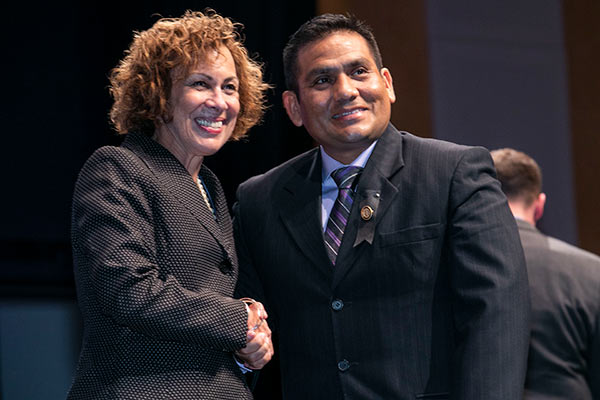 “I’m hearing authentic voices who are passionate about Vanderbilt, about Nashville, and the school’s mission to prepare the best nurses possible for high-quality patient care,” she says.
“I’m hearing authentic voices who are passionate about Vanderbilt, about Nashville, and the school’s mission to prepare the best nurses possible for high-quality patient care,” she says.
Among the goals Jeffries has already set are growing scholarships to bring more advanced practice nurses into the workforce and strengthening the School of Nursing’s health care and community partnerships. “During the past 18 months, public health needs have risen to the top,” she says. “We need to know more about opportunities to make a bigger impact on populations within our nearby communities.”
She will also keep the school’s strong priority on building a diverse and inclusive community as she works with the nursing community, including alumni, to set the school’s overall goals and aspirations for the near and long-term future.
“Dean Jeffries is a visionary leader who converts problems to opportunities,” says Diane Billings, a national leader in nursing education and Chancellor’s Professor of Nursing Emerita at Indiana University. Billings has been a longtime mentor to Jeffries. “Pam thinks big and collaborates effectively to achieve the best outcomes for all. She is a student and faculty advocate and inspires the best in all with whom she interacts.”
Photos:
Top to bottom:
Jeffries in her Vanderbilt office. Photo: John Russell
Jeffries talks with Vanderbilt Adult-Gerontology Primary Care NP students.
Left, Longtime mentor and IUSON Chancellor’s Professor of Nursing Emerita Diane Billings and Jeffries at Indiana University School of Nursing in the mid-90s. Photo: IUSON
Jeffries, her husband, Joe, and their four children during their four years in Indonesia. Photo: Joe Jeffries
Jeffries speaking during a meeting with a delegation from Japan at Johns Hopkins in 2011. Photo: Will Kirk, JHSON
During Jeffries’ tenure as dean of George Washington University School of Nursing, the school experienced a significant period of growth in research funding, enrollment and degree programs.
August 2021 pinning was Jeffries first official event as Vanderbilt dean. Here she congratulates AGACNP graduate Jorge Celedonio. Photo: Anne Raynor